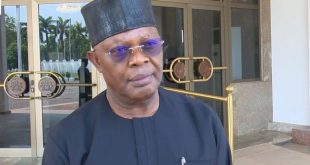
The Federal Government has acknowledged the adverse impact of the newly imposed tariffs by US President Donald Trump on Nigeria’s oil and non-oil exports, which could potentially disrupt trade relations and affect the competitiveness of Nigerian products in the US market.
In a statement issued on Sunday, Nigeria’s Minister of Industry, Trade, and Investment, Dr Jumoke Oduwole, responded to the tariff decision, admitting that the policy would undermine the competitiveness of Nigerian goods, especially in sectors reliant on market access and price competitiveness.
According to the minister, Nigeria’s exports to the United States have averaged $5–6 billion annually in the last two years.
Oduwole said, “A significant portion (of Nigeria’s exports) — over 90 per cent — comprises crude petroleum, mineral fuels, oils, and gas products. The second-largest export category, accounting for approximately 2–3 per cent, includes fertilizers and urea, followed by lead, representing around 1 per cent of total exports (valued at approx $82 million).
Nigeria also exports smaller quantities of agricultural products such as live plants, flour, and nuts, which account for less than 2 per cent of our total exports to the U.S.
“While oil has long dominated Nigeria’s exports to the US, non-oil products—many previously exempt under AGOA—now face potential disruption.
“A new 10 per cent tariff on key categories may impact the competitiveness of Nigerian goods in the U.S. For businesses in the non-oil sector, these measures present destabilising challenges to price competitiveness and market access, especially in emerging and value-added sectors vital to our diversification agenda.”
The minister also noted that smaller businesses, particularly SMEs, that rely on the African Growth and Opportunity Act exemptions would feel the brunt of the new tariff, with rising costs and uncertain buyer commitments likely to make market access even more difficult.
She added, “This development strengthens Nigeria’s resolve to boost its non-oil exports by strengthening quality assurance, control, and traceability in Nigerian exports to meet global standards and improve market acceptance into more economies across the globe.”
Trump’s decision, which has been heavily criticized by global trade experts, will impose tariffs of up to 50 percent on several foreign exports, including Nigerian goods.
This policy shift marks a sharp departure from the global free-trade approach that has been in place for decades.
Economic experts, in separate interviews with The PUNCH, explained that the policy would raise the prices of goods and services for consumers, weaken the standard of living, slow down manufacturing activities, hinder international trade and consequently weaken demand for Nigerian oil in the US, one of its key markets.
 SocietyGazette.com Society Gazette News
SocietyGazette.com Society Gazette News




